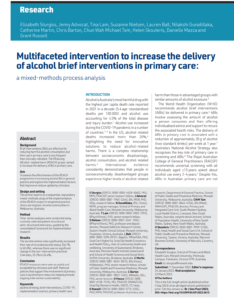 This paper assessing the effectiveness of the REACH program, which aimed to increase the use of alcohol brief interventions in general practice, was published in the British Journal of General Practice (PDF | Web).
This paper assessing the effectiveness of the REACH program, which aimed to increase the use of alcohol brief interventions in general practice, was published in the British Journal of General Practice (PDF | Web).
Sturgiss E, Advocat J, Lam T, …, Tam CWM, … et al. Multifaceted intervention to increase the delivery of alcohol brief interventions in primary care: a mixed-methods process analysis. British Journal of General Practice. 2023; 73 (735): e778-e788. DOI: 10.3399/BJGP.2022.0613
Abstract
Background Brief interventions (BIs) are effective for reducing harmful alcohol consumption, but their use in primary care is less frequent than clinically indicated. The REducing AlCohol- related Harm (REACH) project aimed to increase the delivery of BIs in primary care.
Aim To assess the effectiveness of the REACH programme in increasing alcohol BIs in general practice and explore the implementation factors that improve or reduce uptake by clinicians.
Design and setting This article reports on a sequential, explanatory mixed-methods study of the implementation of the REACH project in six general practice clinics serving low-income communities in Melbourne, Australia.
Method Time-series analyses were conducted using routinely collected patient records and semi-structured interviews, guided by the consolidated framework for implementation research.
Results The six intervention sites significantly increased their rate of recorded alcohol status (56.7% to 60.4%), whereas there was no significant change in the non-intervention practices (344 sites, 55.2% to 56.4%).
Conclusion REACH resources were seen as useful and acceptable by clinicians and staff. National policies that support the involvement of primary care in alcohol harm reduction helped promote ongoing intervention sustainability.
